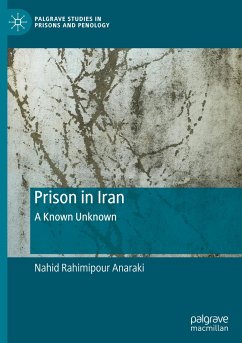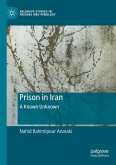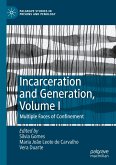This book offers a unique look into prisons in Iran and the lives of the prisoners and their families. It provides an overview of the history of Iranian prisons, depicts the sub-culture in contemporary Iranian prisons, and highlights the forms that gender discrimination takes behind the prison walls. The book draws on the voices of 90 men and women who have been imprisoned in Iran, interviewed in 2012 and 2017 across various parts of the Islamic Republic of Iran. It presents a different approach to the one proposed by Michel Foucault in Discipline and Punish because the author argues that Iran never experienced "the age of sobriety in punishment" and "a slackening of the hold on the body". Whilst penal severity in Iran has reduced, its scope has now extended beyond prisoners to their families, regardless of their age and gender. In Iran, penalties still target the body but now also affect the bodies of the entire prisoner's family. It is not just prisoners who suffer from the lack of food, clothes, spaces for sleeping, health services, legal services, safety, and threats of physical violence and abuse but also their families. The book highlights the costs of mothers' incarceration for their children. It argues that as long as punishment remains the dominant discourse of the penal system, the minds and bodies of anyone related to incarcerated offenders will remain under tremendous strain. This unique book explores the nature of these systems in a deeply under-covered nation to expand understandings of prisons in the non-Western world.
"The book ... provide a rich, thoughtful read. ... Prison in Iran offers a truly unique insight. ... The book is accessible and informative ... . Sociologists and those interested in the theories behind punishment and penal systems should undoubtedly read this book. Human rights activists and country experts alike may also gain a specific benefit. In addition to scholars and students, this book is recommended for anyone interested in the vivid narratives of people who are incarcerated." (Kelly Blount, Crime Law and Social Change, Vol. 76, 2021)
"Prison in Iran. A Known Unknown is a welcome and rare attempt to study 'ordinary' prisons and prisoners in Iran. Through her investigations, observations and interviews Rahimipour Anaraki has successfully depicted the sufferings of prisoners, especially women's and children's, as a reflection of a society in which social inequalities are paramount and where prison's raison d'e tre is not to educate but to punish, not to integrate but to exclude." (Azadeh Kian, Punishment & Society, June 30, 2021)
"Prison in Iran. A Known Unknown is a welcome and rare attempt to study 'ordinary' prisons and prisoners in Iran. Through her investigations, observations and interviews Rahimipour Anaraki has successfully depicted the sufferings of prisoners, especially women's and children's, as a reflection of a society in which social inequalities are paramount and where prison's raison d'e tre is not to educate but to punish, not to integrate but to exclude." (Azadeh Kian, Punishment & Society, June 30, 2021)








